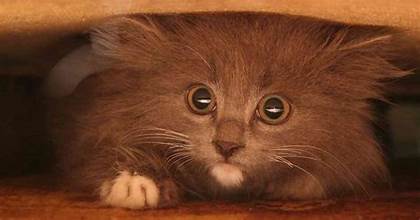Cats are sensitive creatures that can have anxiety, just like humans. Whether it’s due to environmental changes, health issues, or genetic predispositions, understanding the root causes and symptoms of anxiety in cats will help you provide a comforting and secure environment for your feline friend.
Causes of Anxiety in Cats

- Environmental Changes
As cats are creatures of habit, sudden changes such as moving to a new home, introducing new pets, or altering their routine can cause significant stress. - Separation Anxiety
Some cats form strong bonds with their owners and may become anxious when left alone for extended periods. - Health Issues
Pain or underlying medical conditions such as hyperthyroidism, arthritis, or urinary tract infections can trigger anxiety. Always rule out health problems with your vet. - Trauma or Neglect
Cats with a history of abuse or neglect may display heightened anxiety in certain situations. - Genetic Factors
Certain breeds, like Siamese cats, may be more prone to anxiety due to their high-energy and social nature.
Symptoms of Cat Anxiety
Recognizing anxiety in cats is key to addressing it effectively. Common signs include:

- Excessive grooming or fur loss
- Hiding or avoiding interaction
- Aggression or sudden mood swings
- Decreased appetite or overeating
- Litter box issues (urinating or defecating outside the box)
- Vocalization, such as yowling or meowing excessively
- Pacing or other repetitive behaviors
Tips to Create a Calming Environment
- Maintain a Routine
Cats thrive on consistency. Keep feeding times, play sessions, and other daily activities as predictable as possible. - Provide Safe Spaces
Create cozy, secluded areas where your cat can retreat when overwhelmed. A cat tree, hideaway bed, or even a cardboard box can be a haven. - Interactive Play
Engaging your cat with toys that stimulate its hunting instincts, such as feather wands or laser pointers. Regular play can reduce pent-up energy and stress. - Soothing Scents
Use feline pheromone diffusers or sprays, like Feliway, to mimic calming natural scents. - Music and White Noise
Soft classical music or white noise machines can create a tranquil atmosphere, especially in noisy households.
Natural Remedies for Cat Anxiety
- Catnip or Valerian Root
While catnip excites some cats, it calms others. Similarly, valerian root can promote relaxation. - CBD Oil
Specially formulated CBD oils for pets may help reduce anxiety. Consult your vet before use. - Chamomile or Lavender Sprays
These natural scents can help soothe your cat. Ensure the sprays are pet-safe and free from harmful additives. - Calming Treats
Many brands offer anxiety-reducing treats infused with natural ingredients like L-theanine and tryptophan.
Products to Help Manage Cat Anxiety
- Feliway Classic Diffuser
Mimics natural pheromones to reduce stress.
Purchase here. - Thundershirt for Cats
Provides gentle pressure to calm anxious cats.
Purchase here. - PetFusion Ultimate Cat Scratcher Lounge
Combines a scratching post with a resting area, helping to alleviate stress through activity.
Purchase here. - LickiMat Cat Slow Feeder
It encourages licking, which can soothe anxious cats.
Purchase here.
When to Consult a Veterinarian
If your cat’s anxiety persists despite your best efforts, consult a veterinarian or animal behaviorist. Severe cases may require medication or professional intervention.
Final Thoughts
Understanding and managing your cat’s anxiety takes patience and attention to detail. You can identify the causes, address symptoms, and create a calming environment with natural remedies and supportive products to ensure your cat feels safe, loved, and stress-free.





Pingback: What are Cat Urinary Tract Issues: How To Treat Them - Positvley Pets
Pingback: Find Out Why Your Cat Is Biting: Unveiling The Truth - Positvley Pets